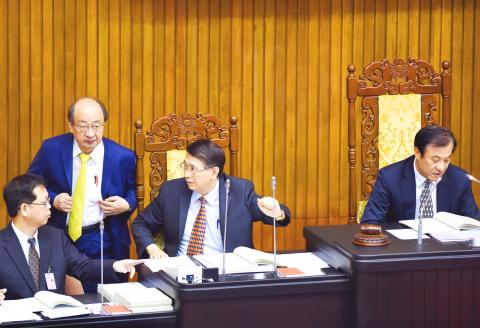The Democratic Progressive Party (DPP) caucus is ready to unveil a draft anti-infiltration law today, caucus whip Ker Chien-ming (柯建銘) said yesterday, adding that the goal is to have the bill clear a second reading on Friday.
Concerns about Beijing’s attempts to annex Taiwan and reports about a self-confessed Chinese spy saying that he had been tasked with influencing elections in Taiwan show that an anti-infiltration law is needed, Ker said.
Following discussions with the Ministry of Justice, Mainland Affairs Council and Executive Yuan, the DPP on Friday devised the core of the bill and would reveal its details at a news conference today, he said.

Photo: Chien Jung-fong, Taipei Times
The bill would be submitted to the legislature’s Procedure Committee for review tomorrow, he added.
On Thursday, the legislature’s Internal Administration Committee is to hold a public hearing on a series of proposed draft amendments to crack down on Chinese proxies promoting Beijing’s interests in Taiwan, Ker said.
The hearing would provide an opportunity to exchange opinions on the anti-infiltration bill before legislators meet on Friday for its second reading, he said.
On whether the bill could clear a third reading before the end of the legislative session, Ker said it depends on “the attitude of opposition parties.”
Chinese Nationalist Party (KMT) caucus whip William Tseng (曾銘宗) said his caucus would determine its stance on the bill after reading the document.
The KMT would consider whether the bill is indeed necessary to ensure national security and stability, he added.
The bill would ban people from lobbying for a political cause, making political donations, interfering with assemblies, undermining social order or engaging in other activities that could influence local elections and referendums based on instructions, or using funds, from a foreign state or organization.
Those found guilty of influencing elections in such manners could be sentenced to up to seven years in prison in addition to a fine of up to NT$5 million (US$163,843), according to the bill.
If an organization is found guilty, the person in charge would be held responsible, it states.
Although a number of laws — including the Political Donations Act (政治獻金法), the Referendum Act (公民投票法), the Lobbying Act (遊說法) and the Civil Servants Election and Recall Act (公職人員選舉罷免法) — already ban such activities, the proposed bill would increase the punishments.
While the New Power Party (NPP) has accused the DPP of deliberately setting aside the bill and related proposed amendments, DPP lawmakers have been working on them since the end of May, Ker said.
On Nov. 16, Ker said that bills to crack down on Chinese Communist Party proxies would not pass a third reading during the current legislative session due to the limited time remaining.
Ker yesterday said there are eight versions of similar bills proposed by the DPP caucus, NPP caucus and a number of DPP legislators.
Incorporating different versions could be difficult and the DPP caucus has been pondering how to best approach the issue, he said.

DAREDEVIL: Honnold said it had always been a dream of his to climb Taipei 101, while a Netflix producer said the skyscraper was ‘a real icon of this country’ US climber Alex Honnold yesterday took on Taiwan’s tallest building, becoming the first person to scale Taipei 101 without a rope, harness or safety net. Hundreds of spectators gathered at the base of the 101-story skyscraper to watch Honnold, 40, embark on his daredevil feat, which was also broadcast live on Netflix. Dressed in a red T-shirt and yellow custom-made climbing shoes, Honnold swiftly moved up the southeast face of the glass and steel building. At one point, he stepped onto a platform midway up to wave down at fans and onlookers who were taking photos. People watching from inside

A Vietnamese migrant worker yesterday won NT$12 million (US$379,627) on a Lunar New Year scratch card in Kaohsiung as part of Taiwan Lottery Co’s (台灣彩券) “NT$12 Million Grand Fortune” (1200萬大吉利) game. The man was the first top-prize winner of the new game launched on Jan. 6 to mark the Lunar New Year. Three Vietnamese migrant workers visited a Taiwan Lottery shop on Xinyue Street in Kaohsiung’s Gangshan District (崗山), a store representative said. The player bought multiple tickets and, after winning nothing, held the final lottery ticket in one hand and rubbed the store’s statue of the Maitreya Buddha’s belly with the other,

‘NATO-PLUS’: ‘Our strategic partners in the Indo-Pacific are facing increasing aggression by the Chinese Communist Party,’ US Representative Rob Wittman said The US House of Representatives on Monday released its version of the Consolidated Appropriations Act, which includes US$1.15 billion to support security cooperation with Taiwan. The omnibus act, covering US$1.2 trillion of spending, allocates US$1 billion for the Taiwan Security Cooperation Initiative, as well as US$150 million for the replacement of defense articles and reimbursement of defense services provided to Taiwan. The fund allocations were based on the US National Defense Authorization Act for fiscal 2026 that was passed by the US Congress last month and authorized up to US$1 billion to the US Defense Security Cooperation Agency in support of the

‘COMMITTED TO DETERRENCE’: Washington would stand by its allies, but it can only help as much as countries help themselves, Raymond Greene said The US is committed to deterrence in the first island chain, but it should not bear the burden alone, as “freedom is not free,” American Institute in Taiwan Director Raymond Greene said in a speech at the Institute for National Defense and Security Research’s “Strengthening Resilience: Defense as the Engine of Development” seminar in Taipei yesterday. In the speech, titled “Investing Together and a Secure and Prosperous Future,” Greene highlighted the contributions of US President Donald Trump’s administration to Taiwan’s defense efforts, including the establishment of supply chains for drones and autonomous systems, offers of security assistance and the expansion of